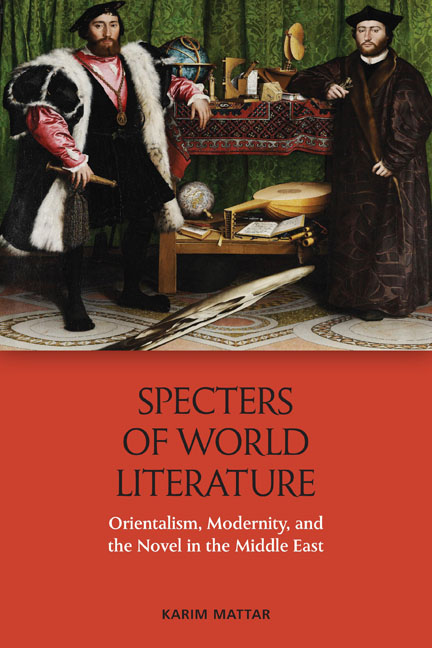Book contents
- Frontmatter
- Contents
- Preface
- Acknowledgments
- Note on Transliterations
- Introduction: Towards a Spectral Theory of World Literature
- I The Worlding of “Literature” in the Middle East
- II The Middle Eastern Novel and the Spectral Life-World of Modernity
- Conclusion: Futures of Spectrality
- Bibliography
- Index
4 - Islam and the Limits of Translation: Orhan Pamuk and the Ottoman Revival
Published online by Cambridge University Press: 20 October 2020
- Frontmatter
- Contents
- Preface
- Acknowledgments
- Note on Transliterations
- Introduction: Towards a Spectral Theory of World Literature
- I The Worlding of “Literature” in the Middle East
- II The Middle Eastern Novel and the Spectral Life-World of Modernity
- Conclusion: Futures of Spectrality
- Bibliography
- Index
Summary
Everything is translatable.
Emily Apter, The Translation ZoneNothing is translatable.
Emily Apter, The Translation ZoneI’m not mourning the Ottoman Empire. I’m a Westernizer. I’m pleased that the Westernization process took place. I’m just criticizing the limited way in which the ruling elite—meaning both the bureaucracy and the new rich—had conceived of Westernization. They lacked the confidence necessary to create a national culture rich in its own symbols and rituals. They did not strive to create an Istanbul culture that would be an organic combination of East and West; they just put Western and Eastern things together. There was, of course, a strong local Ottoman culture, but that was fading away little by little. What they had to do, and could not possibly do enough, was invent a strong local culture, which would be a combination— not an imitation—of the Eastern past and the Western present. I try to do the same kind of thing in my books.
Orhan Pamuk, Interview with The Paris ReviewOrhan Pamuk is widely regarded as a paragon of the contemporary global writer. The recipient of the Nobel Prize in Literature in 2006 as well as a host of other international honors and awards, his novels have sold over 13 million copies worldwide, have been translated into sixtythree languages, and have been met with universal critical acclaim. It is what has been accentuated as Pamuk's cosmopolitan, secular-liberal literary stance on themes including the East / West encounter, the history of the Ottoman Empire, the cultural politics of Islam in Turkey up to the present day, authoritarianism and repression there, the figure of the writer or artist, the social value of literature and the arts, and so forth that the global literary industry has chosen most consistently to celebrate in its framing of the author and his work. This impression of Pamuk is reinforced by what has been taken as the characteristic style in which his novels are written. Writing for the London Review of Books, Adam Shatz characterizes this as “the Esperanto of international literary fiction,” a “playful postmodernism” that mixes genres and pays homage to Western models like Fyodor Dostoyevsky, Thomas Mann, Marcel Proust, James Joyce, William Faulkner, and Jorge Luis Borges.
- Type
- Chapter
- Information
- Specters of World LiteratureOrientalism, Modernity, and the Novel in the Middle East, pp. 215 - 259Publisher: Edinburgh University PressPrint publication year: 2020



